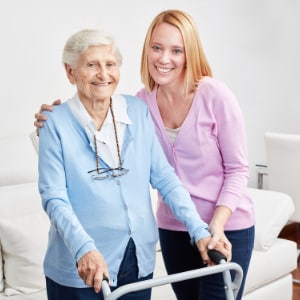Caring for Yourself as You Care for a Loved One
 November is National Family Caregiver Month. Over 53 million Americans are caregivers to family, friends, and neighbors and that number is only expected to grow as the senior population in the country increases.
November is National Family Caregiver Month. Over 53 million Americans are caregivers to family, friends, and neighbors and that number is only expected to grow as the senior population in the country increases.
 Under normal circumstances, being a loved one’s primary caregiver is stressful. The COVID-19 pandemic has added to this stress as you continue caring for your loved one while trying to keep yourself and them safe from the spread of COVID-19. Feelings of stress, worry, and isolation have impacted everyone during the pandemic but may be magnified for those who serve as a primary caregiver for a loved one.
Under normal circumstances, being a loved one’s primary caregiver is stressful. The COVID-19 pandemic has added to this stress as you continue caring for your loved one while trying to keep yourself and them safe from the spread of COVID-19. Feelings of stress, worry, and isolation have impacted everyone during the pandemic but may be magnified for those who serve as a primary caregiver for a loved one.
As you care for others, it’s important to take care of yourself as well both physically and mentally. There’s a saying that goes “you can’t pour from an empty glass,” meaning that if you aren’t taking care of yourself, you won’t be able to give your best to another person. Here are some tips for taking care of yourself as you take care of someone else.
Make sure your physical needs are met.
It’s easy for us to get caught up in our never-ending to-do lists and forget to meet our basic physical needs. This is especially true for caregivers. Make sure you are getting enough sleep, eating nutritious meals three times a day, drinking enough water, and staying active. If you aren’t caring for these needs, you will be tired mentally and physically and caregiving will take an even greater toll on your health.
Acknowledge your feelings about caregiving.
When you’re caring for another person, a lot of the focus—both with them and when talking with others—can be on them. You may be asked what they need or how they feel and those may be the first thoughts on your mind as well. This might make you feel like part of your job as a caregiver is to sacrifice your own happiness to take care of them and you may feel as if you are being selfish if you think of your own feelings. However, you are still a person with feelings and it’s OK to feel a lot of emotions about being a caregiver. You might feel exhausted, stressed, resentful, isolated and alone, or even hopeless. Try not to ignore them as they won’t go away, they’ll just build up until they eventually come out. Find outlets for expressing these feelings like talking to trusted friends, journaling, support groups, or counseling.
Manage your expectations of yourself.
Remember that you are only one person and there is only so much you can do on your own. It’s easy to put pressure on yourself to meet all their needs since they’re unable to by themselves but even if you dedicated all your time and energy to caregiving, you still probably couldn’t do it all on your own. Be realistic of what you’re able to accomplish on your own.
Ask for help.
Find ways to share the caregiving load whenever possible. This could be having a family member take over for a couple hours so you can nap or do something you enjoy. There may be local organizations where you can ask for volunteers to help you out or more formal services like respite care. As you look into these options, involve the person you care for. Ask them what they need and want. There may be things that you’ve been taking care of that they could manage for themselves. Depending on your relationship, you can also have a conversation about how you are feeling so they understand why you are looking for other outlets to help you care for them.
Set boundaries.
You may have to have difficult conversations about what you are willing and able to do as a caregiver. It could be that other family is capable of helping but have chosen to leave the burden on you. Or, it could be that the person you’re caring for has unreasonable expectations of you. Before you approach these conversations, it can help to write out your thoughts or talk them through with a trusted friend. Decide what boundaries you need to set for your own wellbeing and stick to them. It’s OK to be firm. People often struggle with new boundaries but in time they will adjust. You’ll have a better experience as a caregiver if you communicate clearly with everyone involved.
John Tucker is the Director of Senior Services at Fisher-Titus. Fisher-Titus offers a continuum of care for seniors including Home Health, Assisted Living, and Skilled Nursing. For more information, visit fishertitus.org/senior-health-services
